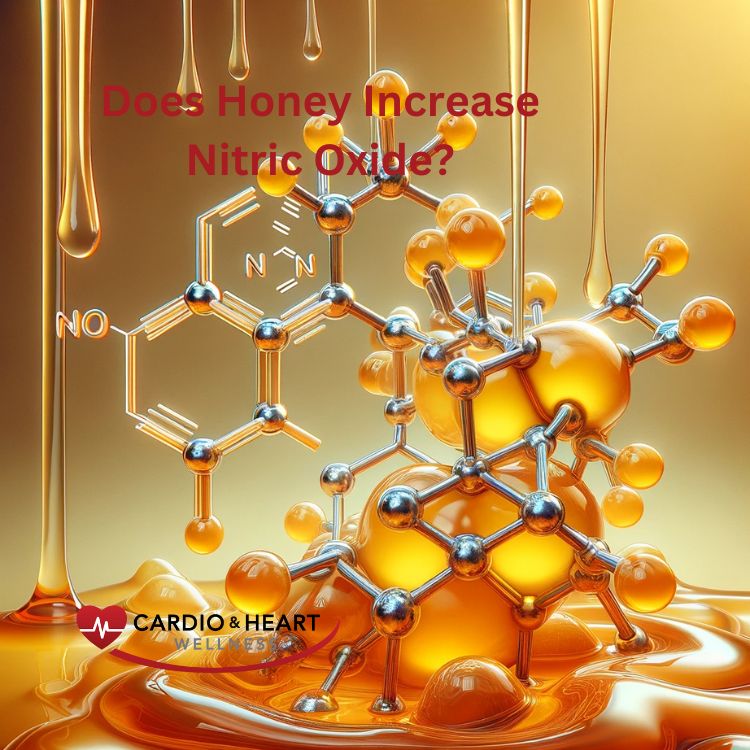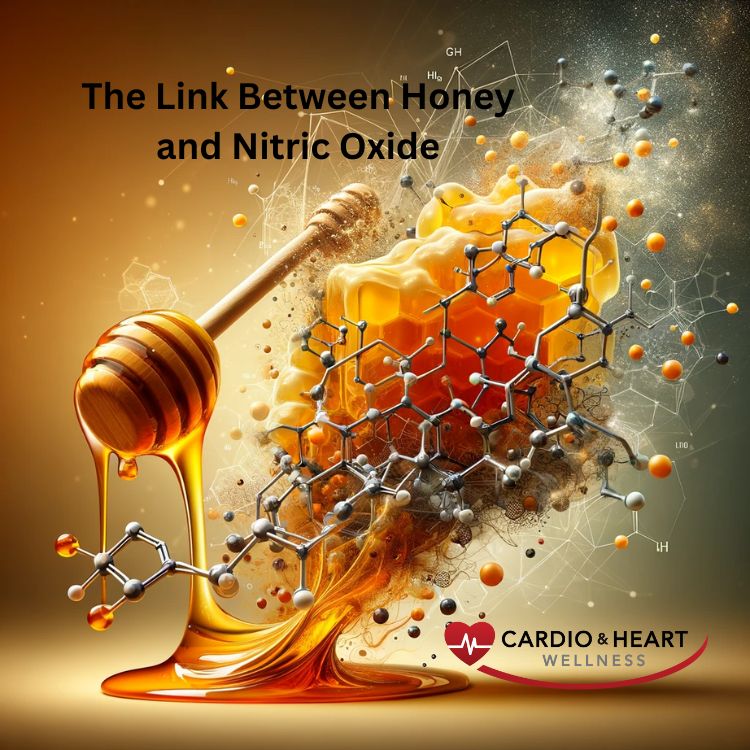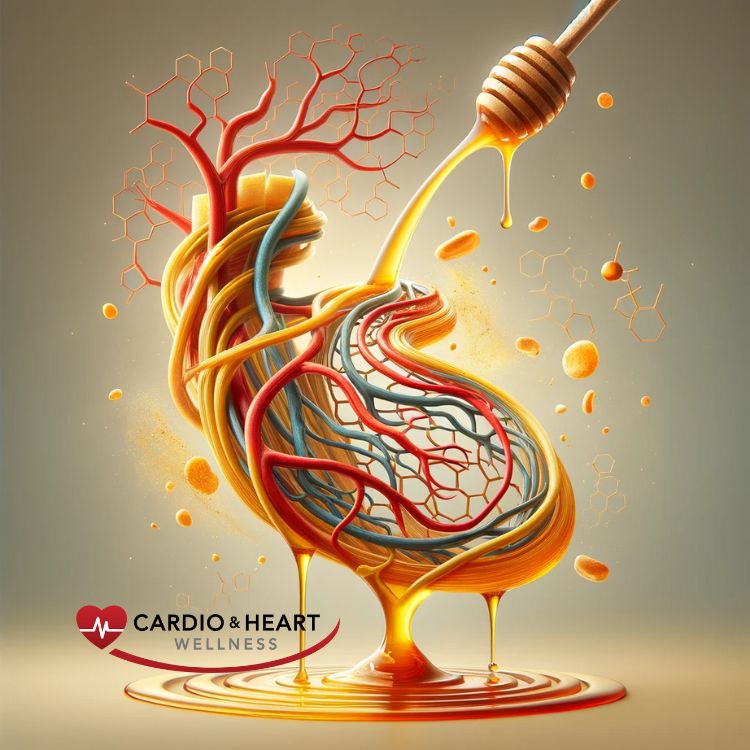“Does Honey Increase Nitric Oxide?” This question has garnered significant interest among those seeking natural methods to enhance cardiovascular health. In this article, we explore the scientific relationship between honey and Nitric Oxide (NO), a crucial molecule for heart wellness. We also compare the potential of honey with specialized Nitric Oxide supplements like Cardio & Heart Wellness’s Nitric Oxide Plus, delving into the efficacy and benefits of each.

Understanding Nitric Oxide and Its Importance
Nitric Oxide (NO) is a fundamental molecule in the human body, particularly in the context of cardiovascular health. Its discovery and understanding have revolutionized the field of medicine, leading to significant advancements in treating heart diseases.
- What is Nitric Oxide? Nitric Oxide is a gas naturally produced by the body. It is a simple molecule, consisting of one nitrogen atom and one oxygen atom. Despite its simplicity, NO plays a complex and crucial role in various physiological processes.
- Role in Cardiovascular Health: One of the primary functions of Nitric Oxide is to maintain vascular health. It acts as a vasodilator, meaning it relaxes the inner muscles of the blood vessels, causing them to widen and increase blood flow. This process is essential in regulating blood pressure and ensuring adequate blood supply to different body parts.
- NO and Heart Disease: Inadequate Nitric Oxide production is linked to various cardiovascular diseases, including hypertension, coronary artery disease, and heart failure. The ability of NO to prevent blood clots and reduce vascular inflammation is vital in preventing these conditions.
- Endothelial Function and NO: The endothelium, the inner lining of blood vessels, is responsible for producing Nitric Oxide. Healthy endothelial function is critical for adequate NO production. Factors such as oxidative stress, high cholesterol, and smoking can impair endothelial function, leading to decreased NO levels.
- Research and Discoveries: The significance of Nitric Oxide in cardiovascular health was highlighted by the Nobel Prize in Physiology or Medicine in 1998, awarded for discoveries concerning “Nitric Oxide as a signaling molecule in the cardiovascular system.” This recognition underscored the molecule’s importance in heart health and medical research. Link to Nobel Prize announcement
- NO and Lifestyle Factors: Lifestyle factors such as diet, exercise, and stress management can significantly impact Nitric Oxide levels. A diet rich in nitrates (found in leafy greens and beets), antioxidants, and amino acids like L-arginine and L-citrulline can boost NO production. Regular physical activity also enhances endothelial function, thereby increasing NO synthesis.
- NO as a Therapeutic Target: Due to its crucial role in cardiovascular health, Nitric Oxide has become a key therapeutic target in treating and preventing heart diseases. Medications and supplements that can increase NO production or mimic its effects are widely used in clinical settings.
Honey: A Natural Sweetener with Health Benefits
Honey, often celebrated for its sweet taste, is more than just a natural sweetener. It’s a complex substance with a rich history and a multitude of health benefits, particularly in the context of cardiovascular health and its potential role in Nitric Oxide (NO) production.
- Composition of Honey: Honey is a natural substance produced by bees from the nectar of flowers. It consists primarily of sugars like fructose and glucose, but it also contains a variety of other components, including water, minerals, vitamins, enzymes, amino acids, and antioxidants. The exact composition can vary depending on the floral source and environmental factors.
- Antioxidant Properties: One of the key health benefits of honey is its antioxidant content. Honey contains a range of compounds such as flavonoids, phenolic acids, ascorbic acid, and enzymes like catalase and peroxidase, which contribute to its antioxidant capacity. These antioxidants can neutralize free radicals in the body, reducing oxidative stress and inflammation, which are risk factors for many chronic diseases, including heart disease.
- Anti-inflammatory and Antibacterial Effects: Honey is known for its anti-inflammatory and antibacterial properties. These properties not only make it beneficial for wound healing and treating infections but also may have implications for heart health. Chronic inflammation is a known contributor to cardiovascular diseases, and the anti-inflammatory effects of honey can be beneficial in this context.
- Honey and Glycemic Index: Although honey is a sweetener, it has a lower glycemic index (GI) compared to regular sugar. This means it does not spike blood sugar levels as rapidly, making it a healthier option for sweetening, especially for people with diabetes or those mindful of their blood sugar levels.
- Cultural and Historical Use: Honey has been used for medicinal purposes in various cultures for thousands of years. Ancient civilizations recognized its health benefits, and modern science is now catching up in understanding how honey can contribute to overall health and wellness.
- Honey in a Balanced Diet: While honey offers several health benefits, it is still a source of calories and should be consumed in moderation. Incorporating honey into a balanced diet can provide its health benefits without contributing to excessive calorie intake.
- Research on Honey and Health: Numerous studies have investigated the health benefits of honey. For example, research published in the “Journal of Medicinal Food” highlights the potential therapeutic properties of honey in various medical conditions, including cardiovascular diseases.
The Link Between Honey and Nitric Oxide

Antioxidants in Honey
Honey’s role in promoting Nitric Oxide production is significantly attributed to its rich antioxidant content. These antioxidants play a pivotal role in various physiological processes, especially in enhancing cardiovascular health.
- Types of Antioxidants in Honey: Honey is a natural source of powerful antioxidants, including flavonoids, phenolic acids, ascorbic acid, tocopherols, and enzymes like catalase and peroxidase. Each of these compounds contributes to honey’s overall antioxidant capacity. A study in the “Journal of Agricultural and Food Chemistry” provides an in-depth analysis of the antioxidant components found in different types of honey.
- Flavonoids and Phenolic Acids: These are the primary antioxidants in honey, known for their ability to scavenge free radicals and reduce oxidative stress. Flavonoids, such as quercetin, kaempferol, and chrysin, and phenolic acids like caffeic acid, are particularly effective in this regard. Research published in “Food Chemistry” explores the flavonoid and phenolic content in honey and their antioxidant activities.
- Impact on Endothelial Function: The antioxidants in honey can enhance endothelial function by reducing oxidative stress and inflammation, leading to improved Nitric Oxide production. A study in the “European Journal of Nutrition” discusses how the antioxidant properties of honey can positively affect endothelial function.
- Role in Nitric Oxide Synthesis: Antioxidants in honey not only protect NO from oxidative degradation but also stimulate the endothelial cells to produce more Nitric Oxide. This dual role is crucial for maintaining optimal NO levels in the body. The “Journal of Biological Chemistry” has published findings on how certain antioxidants can influence Nitric Oxide synthesis.
- Honey vs. Other Antioxidant Sources: When compared to other natural antioxidant sources, honey’s unique composition makes it a valuable dietary component for enhancing Nitric Oxide production. A comparative study in “Nutrition Research” highlights the effectiveness of honey’s antioxidant properties compared to other sources.
Honey’s Impact on Endothelial Function

The endothelium, a thin membrane lining the inside of the heart and blood vessels, plays a critical role in cardiovascular health. It regulates vascular relaxation and contraction, blood clotting, immune function, and platelet adhesion. Honey’s impact on endothelial function is a key area of interest, particularly in how it may influence Nitric Oxide production.
- Enhancing Endothelial Nitric Oxide Synthase (eNOS) Activity: Honey contains compounds that can activate eNOS, the enzyme responsible for producing Nitric Oxide in the endothelium. This activation leads to increased NO synthesis, which is vital for maintaining vascular health and preventing conditions like hypertension. Research supporting this can be found in studies like those published in the “Journal of Biological Chemistry,” where the effects of natural compounds on eNOS activity are explored.
- Reducing Oxidative Stress: Oxidative stress can impair endothelial function, leading to reduced NO availability. The antioxidants in honey, such as flavonoids and polyphenols, combat oxidative stress, thereby supporting the health of the endothelium and promoting NO production. A study in the “Journal of Agricultural and Food Chemistry” highlights the antioxidant properties of honey and their effects on endothelial health.
- Anti-inflammatory Properties: Chronic inflammation can damage the endothelium. Honey’s anti-inflammatory properties help in preserving endothelial integrity. By reducing inflammation, honey indirectly supports the endothelium’s ability to produce Nitric Oxide effectively. This is supported by research in the “European Journal of Clinical Nutrition,” which discusses the anti-inflammatory effects of honey.
- Improving Blood Vessel Dilation: Studies have shown that honey can improve blood vessel dilation, a process heavily dependent on Nitric Oxide. This improvement indicates a direct positive effect of honey on endothelial function. A relevant study can be found in the “International Journal of Food Sciences and Nutrition,” which examines the impact of honey consumption on blood vessel function.
- Clinical Research: Clinical studies, such as those published in the “International Journal of Food Sciences and Nutrition,” have observed that the consumption of honey leads to improved endothelial function in humans. This improvement is attributed to the increased bioavailability of Nitric Oxide in the bloodstream.
Research Evidence
Several studies have investigated the impact of honey on Nitric Oxide levels. For instance:
- A Study on Honey and Endothelial Function: A study published in the “Journal of Agricultural and Food Chemistry” found that natural honey increased NO levels in human endothelial cells. The research suggested that the phenolic compounds in honey might be responsible for this effect.
- Honey and Cardiac Health: Another study in the “European Journal of Nutrition” indicated that long-term consumption of honey might improve cardiovascular risk factors, partly due to increased Nitric Oxide production.
- Comparative Studies: Comparative studies, like one published in “Nutrition Research,” have shown that honey, compared to other sweeteners, has a more significant positive effect on Nitric Oxide levels.
Honey Nitric Oxide: Comparing with Nitric Oxide Supplements
While honey has been identified as a natural source that may enhance Nitric Oxide (NO) levels in the body, it’s important to compare its efficacy with that of specialized Nitric Oxide supplements, such as Cardio & Heart Wellness’s Nitric Oxide NO Plus. This comparison helps in understanding the role each can play in a heart-healthy regimen.
- Direct vs. Indirect NO Production: Honey may increase NO levels indirectly through its antioxidant properties, which improve endothelial function and thereby enhance the body’s natural NO production. In contrast, Nitric Oxide supplements are often formulated to directly increase NO levels. They typically contain precursors to NO, such as L-arginine and L-citrulline, which are directly converted into Nitric Oxide in the body.
- Concentration and Absorption: The concentration of NO-boosting compounds in honey is relatively low compared to specialized supplements. Supplements are designed to provide optimal dosages of these compounds, ensuring more efficient absorption and effectiveness in raising NO levels.
- Consistency and Dosage Control: With honey, the concentration of beneficial compounds can vary significantly depending on the type and source. Supplements, on the other hand, offer a consistent and controlled dosage, which is crucial for achieving the desired therapeutic effects.
- Targeted Benefits: Nitric Oxide supplements are specifically formulated to support cardiovascular health. They often include additional heart-friendly ingredients, such as antioxidants and vitamins, that work synergistically with NO precursors to enhance heart health. Honey, while beneficial, is a more general health supplement and does not specifically target cardiovascular health.
- Scientific Formulation: Supplements like Nitric Oxide NO Plus are developed based on scientific research and are tailored to maximize the benefits of Nitric Oxide for the heart. The formulation is often backed by clinical trials and studies, ensuring their efficacy and safety.
- Ease of Incorporation into Diet: While honey can be easily added to the diet, its sweetness and caloric content limit the amount that can be consumed daily. Supplements, however, can be taken in a more controlled manner without adding extra calories or sugar to the diet.
- Research and Evidence: The effectiveness of Nitric Oxide supplements in enhancing NO levels and improving cardiovascular health is well-documented in scientific literature. For instance, studies published in journals like the “American Heart Journal” have examined the role of L-arginine supplements in improving blood flow and heart health.
In summary, while honey has potential benefits in increasing Nitric Oxide levels due to its antioxidant properties, Nitric Oxide supplements like Nitric Oxide Plus offer a more direct, concentrated, and scientifically formulated approach to enhancing NO levels for cardiovascular health. Supplements provide a consistent and controlled way to harness the benefits of Nitric Oxide, making them a more suitable option for individuals specifically looking to improve their heart health.
Concentration and Absorption
When comparing the effectiveness of honey and Nitric Oxide supplements like Nitric Oxide Plus in boosting Nitric Oxide levels, two critical factors to consider are the concentration of active ingredients and their absorption in the body.
- Concentration of Active Ingredients: Honey contains various compounds that can potentially enhance Nitric Oxide production, such as antioxidants and phenolic acids. However, the concentration of these compounds in honey is relatively low compared to the targeted, high-potency ingredients found in Nitric Oxide supplements. Supplements are specifically formulated to provide an optimal concentration of NO-boosting compounds like L-arginine, L-citrulline, and nitrates, which are directly involved in the synthesis of Nitric Oxide in the body.
- Bioavailability and Absorption: The bioavailability of the NO-boosting compounds is another crucial aspect. In honey, the varied composition and the presence of other natural sugars and substances may affect the absorption and efficiency of its beneficial compounds. On the other hand, Nitric Oxide supplements are designed for enhanced bioavailability. This means that the body can more readily absorb and utilize the active ingredients. The formulation of these supplements often includes components that aid in the optimal absorption and utilization of the NO precursors, ensuring that they effectively contribute to increasing Nitric Oxide levels.
- Consistency in Dosage: With honey, the amount of beneficial compounds can vary significantly from batch to batch, depending on factors like the type of flowers the bees have pollinated, the geographical location, and the processing methods. This variability can make it challenging to achieve a consistent and effective dosage. In contrast, Nitric Oxide supplements provide a consistent and measured dose of NO-boosting ingredients, ensuring a reliable and controlled intake.
- Synergistic Formulation in Supplements: Many Nitric Oxide supplements, including Nitric Oxide NO Plus, are formulated with a combination of ingredients that work synergistically to enhance NO production. This may include a blend of amino acids, vitamins, and other nutrients that not only support NO production but also contribute to overall cardiovascular health.
Targeted Benefits
Nitric Oxide supplements, such as Cardio & Heart Wellness’s Nitric Oxide Plus, are specifically designed to target cardiovascular health. Unlike honey, which offers a broad spectrum of health benefits, these supplements are formulated with a singular focus: to enhance Nitric Oxide production and support heart health. The ingredients in these supplements are selected based on their proven efficacy in improving blood flow, reducing blood pressure, and enhancing overall heart function. Additionally, they often include other heart-friendly ingredients like antioxidants, vitamins, and minerals that work in concert with Nitric Oxide precursors. This targeted approach ensures that the supplements address specific cardiovascular needs more effectively than general health products like honey. By concentrating on heart health, Nitric Oxide supplements provide a more direct and potent solution for those specifically looking to improve their cardiovascular wellness.
Scientifically Formulated
The Role of Diet in Nitric Oxide Production
Honey in a Heart-Healthy Diet
Incorporating honey into a heart-healthy diet can be beneficial due to its natural antioxidants and anti-inflammatory properties. As a healthier alternative to refined sugars, honey adds sweetness without the rapid spike in blood glucose levels. Its rich content of flavonoids and phenolic compounds can contribute to cardiovascular health by supporting endothelial function and potentially enhancing Nitric Oxide production. However, moderation is key, as honey is still a source of calories. Used judiciously, honey can be a valuable and flavorful addition to a balanced, heart-conscious diet.
Conclusion
Honey can contribute to increased Nitric Oxide levels, but for targeted NO enhancement, Nitric Oxide supplements like Nitric Oxide Plus offer a more effective approach. While honey is beneficial in a balanced diet, NO supplements provide a direct solution for boosting NO levels.
Disclaimer
This article is for informational purposes only and is not a substitute for professional medical advice, diagnosis, or treatment. Always consult with a healthcare provider for any medical concerns.


